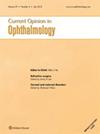Novel artificial intelligence for diabetic retinopathy and diabetic macular edema: what is new in 2024?
IF 2.6
2区 医学
Q1 OPHTHALMOLOGY
引用次数: 0
Abstract
PURPOSE OF REVIEW Given the increasing global burden of diabetic retinopathy and the rapid advancements in artificial intelligence, this review aims to summarize the current state of artificial intelligence technology in diabetic retinopathy detection and management, assessing its potential to improve care and visual outcomes in real-world settings. RECENT FINDINGS Most recent studies focused on the integration of artificial intelligence in the field of diabetic retinopathy screening, focusing on real-world efficacy and clinical implementation of such artificial intelligence models. Additionally, artificial intelligence holds the potential to predict diabetic retinopathy progression, enhance personalized treatment strategies, and identify systemic disease biomarkers from ocular images through 'oculomics', moving towards a more precise, efficient, and accessible care. The emergence of foundation model architectures and generative artificial intelligence, which more clearly reflect the clinical care process, may enable rapid advances in diabetic retinopathy care, research and medical education. SUMMARY This review explores the emerging technology of artificial intelligence to assess the potential to improve patient outcomes and optimize personalized management in healthcare delivery and medical research. While artificial intelligence is expected to play an increasingly important role in diabetic retinopathy care, ongoing research and clinical trials are essential to address implementation issues and focus on long-term patient outcomes for successful real-world adoption of artificial intelligence in diabetic retinopathy.治疗糖尿病视网膜病变和糖尿病黄斑水肿的新型人工智能:2024 年的新动向?
本综述旨在总结人工智能技术在糖尿病视网膜病变检测和管理中的应用现状,评估其在实际环境中改善护理和视觉效果的潜力。最近的发现最近的大多数研究都侧重于人工智能在糖尿病视网膜病变筛查领域的整合,重点关注此类人工智能模型的实际效果和临床应用。此外,人工智能还具有预测糖尿病视网膜病变进展、增强个性化治疗策略以及通过 "眼科组学 "从眼部图像中识别系统疾病生物标记物的潜力,从而实现更精确、更高效、更便捷的护理。基础模型架构和生成式人工智能的出现更清晰地反映了临床护理过程,可使糖尿病视网膜病变护理、研究和医学教育取得快速进展。虽然人工智能有望在糖尿病视网膜病变护理中发挥越来越重要的作用,但持续的研究和临床试验对于解决实施问题和关注患者的长期疗效至关重要,以便在糖尿病视网膜病变的实际应用中成功采用人工智能。
本文章由计算机程序翻译,如有差异,请以英文原文为准。
求助全文
约1分钟内获得全文
求助全文
来源期刊
CiteScore
6.80
自引率
5.40%
发文量
120
审稿时长
6-12 weeks
期刊介绍:
Current Opinion in Ophthalmology is an indispensable resource featuring key up-to-date and important advances in the field from around the world. With renowned guest editors for each section, every bimonthly issue of Current Opinion in Ophthalmology delivers a fresh insight into topics such as glaucoma, refractive surgery and corneal and external disorders. With ten sections in total, the journal provides a convenient and thorough review of the field and will be of interest to researchers, clinicians and other healthcare professionals alike.

 求助内容:
求助内容: 应助结果提醒方式:
应助结果提醒方式:


